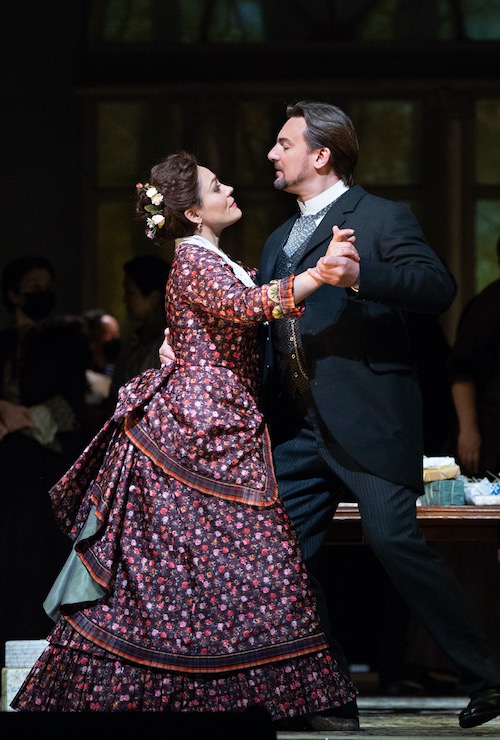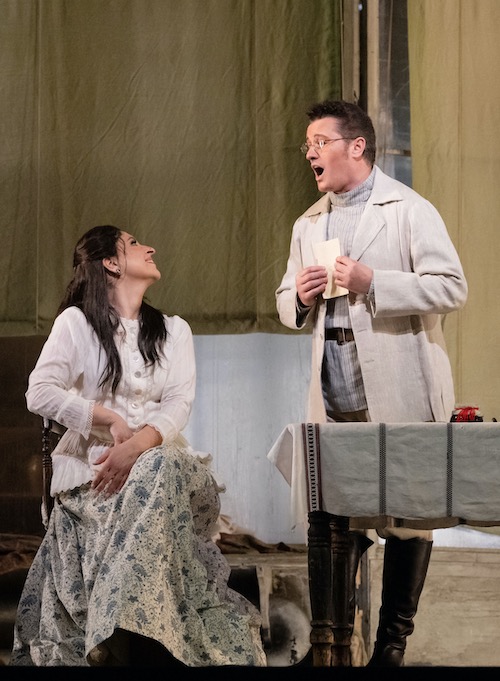Beczała provides the soaring highlights in Met’s “Eugene Onegin”

There was something spectacular in the Metropolitan Opera’s season premiere of Eugene Onegin: Piotr Beczała’s sensational singing in his Act II aria. Beczała gave voice to Lenski’s memories of his carefree youth as he awaits for Onegin to arrive for their fatal duel in beautiful, molten tone, coupled with a passionate, yet subtle, outpouring of emotion. This exceptional artist, at the pinnacle of his powers, transformed Lenski’s aria into an unforgettable moment.
Up to that point, the performance had been on a low simmer. Tchaikovsky, himself, didn’t think Pushkin’s novel had the strongest plot — a egotistical cad rejects a naive country girl, kills his best friend in a duel, and is left in despair when years later, the girl, now an alluring woman married to a wealthy prince, acknowledges her love for him, but rejects him.The story did inspire him, however, to compose some wonderful music.
Yet the dramatic inertness of the opening scenes was due to Ailyn Pérez, who was singing the role of Tatiana for the first time. Tatiana is described as shy, but Pérez made her into an introvert, who was little more than a cypher. The voice has its allure, and there was much beautiful singing, but Pérez displayed little temperament. Hopefully, as Pérez settles into the role, she will turn up the heat.
As Onegin, Igor Golovatenko came into his own in the Act II duet with Lensky, just before killing his friend in the duel. It was in the final scene, however, where Golovatenko displayed the full power and beauty of his voice. Handsome and dashing, the best thing about Golovatenko’s Onegin is that you never once felt any sympathy for him.

Varduhi Abrahamyan was appropriate flighty as Olga, whose seemingly innocent, light-hearted flirtations with Onegin set the stage for the disastrous course of events.
As Madame Larina, Elena Zaremba was an endearing combination of maternal warmth and bourgeois benevolence.The opening scenes were enlivened by Larissa Diadkova’s Fillipyevna. Now 70, Diadkova’s voice is in astonishingly good form, and her detailed characterization was a masterclass in acting.
Bass Ain Anger made for a robust, handsome Prince Gremin. The vibrancy of his voice and the mist of romance with which he infused his Act III aria was particularly effective. Tony Stevenson gave a delightful account of Monsieur Triquet’s birthday ditty to Tatiana.
Richard Bernstein was a commanding, assertive Zaretski, Lenski’s second in the fatal duel. Vladyslav Buialskyi, a member of the Met’s Lindemann Young Artist Programme, sang with verve and danced with style as the Captain, who makes an appearance at Tatiana’s birthday party.
In the pit, James Gaffigan led a sweeping account of Tchaikovsky’s sumptuous score with its soaring melodies and lively dances. The interplay between the woodwinds and horns in the Letter Scene was beautiful rendered and perfectly in scale with Pérez’s account of the aria. Orchestra and chorus performed with their customary excellence.
There is nothing particularly visually exciting about Deborah Warner’s production, imported from the English National Opera, which opened the Met’s 2013-14 season. Of little impact, is the updating of the action to the later part of the nineteenth-century, instead of 1820, where Tchaikovsky set it.
Tom Pye’s sets are grand, but bland. All of Act I plays out in a large, somewhat shabby room of the Larin estate. Tatiana’s birthday festivities take place in an interior room of the house, with walls replacing windows. Giant columns in two rows serve for both Gremin’s palace and the snowy outdoor scene where Tatiana dashes Onegin’s dreams of love and a life together with her. Most successful is the bleak, wintery landscape where Lenski and Onegin duel.
The realistic photographs of the various locals where the tragedy unfolds projected on the scrim between scenes and acts were far more effective in establishing mood and place than the sets.
Eugene Onegin continues through April 14. metopera.org